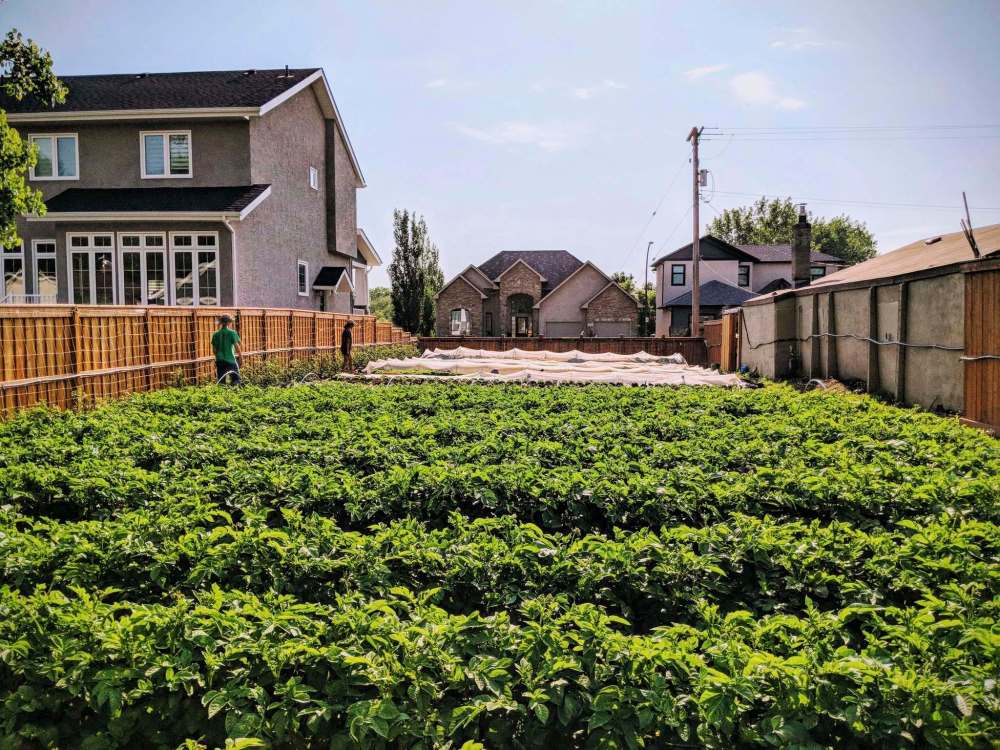Council should let garden plan take root
Read this article for free:
or
Already have an account? Log in here »
To continue reading, please subscribe:
Monthly Digital Subscription
$1 per week for 24 weeks*
- Enjoy unlimited reading on winnipegfreepress.com
- Read the E-Edition, our digital replica newspaper
- Access News Break, our award-winning app
- Play interactive puzzles
*Billed as $4.00 plus GST every four weeks. After 24 weeks, price increases to the regular rate of $19.95 plus GST every four weeks. Offer available to new and qualified returning subscribers only. Cancel any time.
Monthly Digital Subscription
$4.99/week*
- Enjoy unlimited reading on winnipegfreepress.com
- Read the E-Edition, our digital replica newspaper
- Access News Break, our award-winning app
- Play interactive puzzles
*Billed as $19.95 plus GST every four weeks. Cancel any time.
To continue reading, please subscribe:
Add Free Press access to your Brandon Sun subscription for only an additional
$1 for the first 4 weeks*
*Your next subscription payment will increase by $1.00 and you will be charged $16.99 plus GST for four weeks. After four weeks, your payment will increase to $23.99 plus GST every four weeks.
Read unlimited articles for free today:
or
Already have an account? Log in here »
Hey there, time traveller!
This article was published 18/03/2021 (1813 days ago), so information in it may no longer be current.
Quick question: would you rather buy a tomato picked earlier today from an urban farm near your home, or would you rather buy a tomato that was picked in Mexico while unripe and driven 3,400 kilometres to Winnipeg in a truck spewing fossil-fuel exhaust into the air?
It’s a leading question, certainly, but it underscores why Winnipeg city council should amend its bylaws to allow urban farms in more areas of the city. As the tomato question suggests, people prefer locally grown produce because it tastes better and because long-distance food transportation harms the environment.
More garden plots could take root under city proposal

Posted:
IF you make it easier to grow, will local food pop up in more places?
As it now stands, farming within Winnipeg needs special approval unless it’s in agricultural and larger rural residential zones. A proposal that went to council last week would let more food be grown in more areas without residents needing to apply for a change-of-use land designation.
It would remove red tape so entrepreneurs could borrow or rent land — likely vacant lots and backyards — to grow produce to sell. Where would they sell? The proposal also asks that growers be allowed to connect with customers in commercial, industrial or institutional areas, and in some parks. In some cities where urban agriculture already flourishes, grocery stores and markets buy wholesale from local producers because customers like fresh produce.
Importantly, in a city where soil is covered with snow for several months a year, the city is also being asked to make it easier for urban farmers to grow their crops indoors, using methods such as hydroponics and vertical gardening.
Clearing the way for profit-aimed urban farming is different from the 60 or so community gardens that already exist in Winnipeg and are managed by various groups that distribute the bounty of the harvest, usually for free and especially to people who contribute sweat equity.
In the larger context, the request before Winnipeg council is part of a boom in urban farming in recent years. Perhaps spurred on by Michelle Obama’s 2012 book American Grown: The Story of the White House Kitchen Garden and Gardens Across America, cities throughout North America have changed zoning regulations and started programs that encourage people to grow vegetables in vacant lots or even on rooftops.
Promoters of urban farming understandably have a healthy enthusiasm for the movement, although some of their claims are based more on passion and less on research. Perhaps it’s putting too much responsibility on a scattering of urban vegetable patches to say they can revitalize rundown neighbourhoods, significantly filter air pollution, fix food insecurity and remedy a city’s unhealthy eating habits.
Studies have shown a prevalence of urban farms increases property values, heightens social bonds among neighbours, reduces crime and is appreciated by wild creatures, including bees.
Realistically, however, studies have shown a prevalence of urban farms increases property values, heightens social bonds among neighbours, reduces crime and is appreciated by wild creatures, including bees.
The effects of the pandemic during the past year have made it a particularly apt time for Winnipeg to make it easier to jump on the urban-farm bandwagon.
Winnipeggers who have lost their jobs, or had their hours reduced, might appreciate council making it easier for them to start their own vegetable micro-business, where the only seed money required is enough to buy seeds. They might find a grateful market among Winnipeg consumers who, during the pandemic, have seen food prices rise.
If councillors approve the proposal — and they should — they will be voting in favour of a buy-local economy that will let entrepreneurs turn unused land into lush greenery, and will give consumers of Winnipeg more alternatives to buy produce fresh off the vine. As writer Lewis Grizzard once said, “It’s difficult to think anything but pleasant thoughts while eating a homegrown tomato.”








